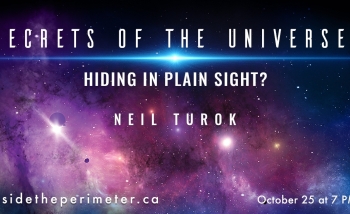Wednesday May 3, 2017 at 7 PM ET
The live webcast will appear on this page
More than a billion years ago, two black holes collided. In the final second of their long life together, the black holes banged out a rhythm like mallets on a drum, creating gravitational waves – ripples in the shape of spacetime.
One hundred years ago, Albert Einstein predicted the existence of such waves, though it seemed improbable – if not outright impossible – that we’d ever be able to actually detect them. They were long considered too faint for any earthbound experiment to measure.
Undaunted, experimentalists were determined to measure these Lilliputian ripples, and after many decades of work and collaboration, they built LIGO – the Laser Interferometer Gravitational-Wave Observatory. This incredible sophisticated and sensitive instrument was made to listen for the beat of that distant drum. In 2015, a billion years after the two black holes collided, their waves rippled through the LIGO detectors in Louisiana and Washington.
With these remarkable new observatories, we can now capture the soundtrack to accompany the silent movie of the history of our universe.
During her live public lecture webcast at Perimeter Institute on May 3, Janna Levin of Columbia University will explain this "discovery of the century" and what it means for the future of science.
About Janna Levin
Janna Levin is the Tow Professor of physics and astronomy at Barnard College of Columbia University, and has contributed to an understanding of black holes, the cosmology of extra dimensions, and gravitational waves in the shape of spacetime. She is also director of sciences at Pioneer Works. Her previous books include How the Universe Got Its Spots and a novel, A Madman Dreams of Turing Machines, which won the PEN/Bingham Prize. She was recently named a Guggenheim Fellow. Her latest book, Black Hole Blues and Other Songs from Outer Space, is the inside story on the discovery of the century: the sound of spacetime ringing from the collision of two black hole over a billion years ago.
About PI
Perimeter Institute is the world’s largest research hub devoted to theoretical physics. The independent Institute was founded in 1999 to foster breakthroughs in the fundamental understanding of our universe, from the smallest particles to the entire cosmos. Research at Perimeter is motivated by the understanding that fundamental science advances human knowledge and catalyzes innovation, and that today’s theoretical physics is tomorrow’s technology. Located in the Region of Waterloo, the not-for-profit Institute is a unique public-private endeavour, including the Governments of Ontario and Canada, that enables cutting-edge research, trains the next generation of scientific pioneers, and shares the power of physics through award-winning educational outreach and public engagement.
You might be interested in



